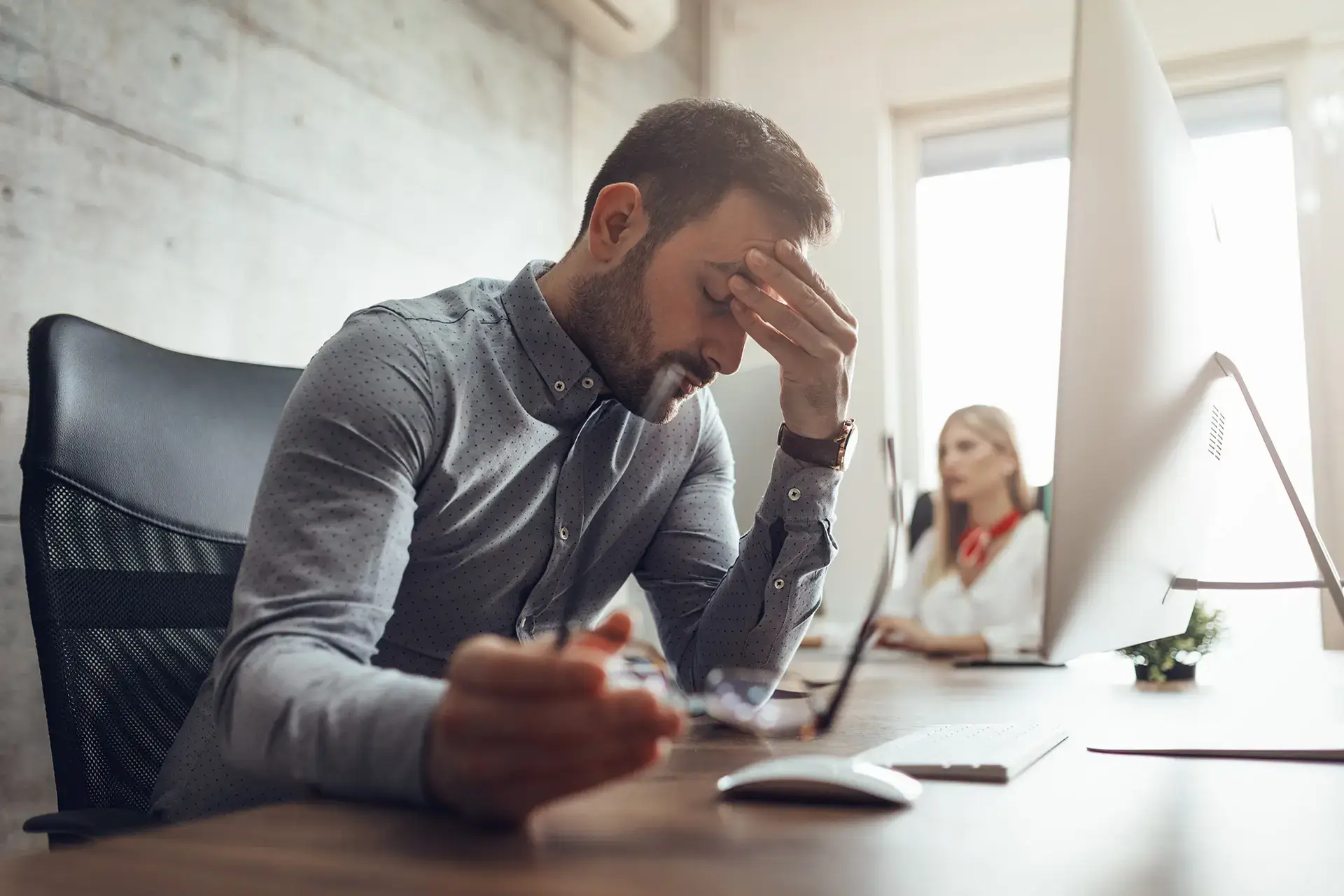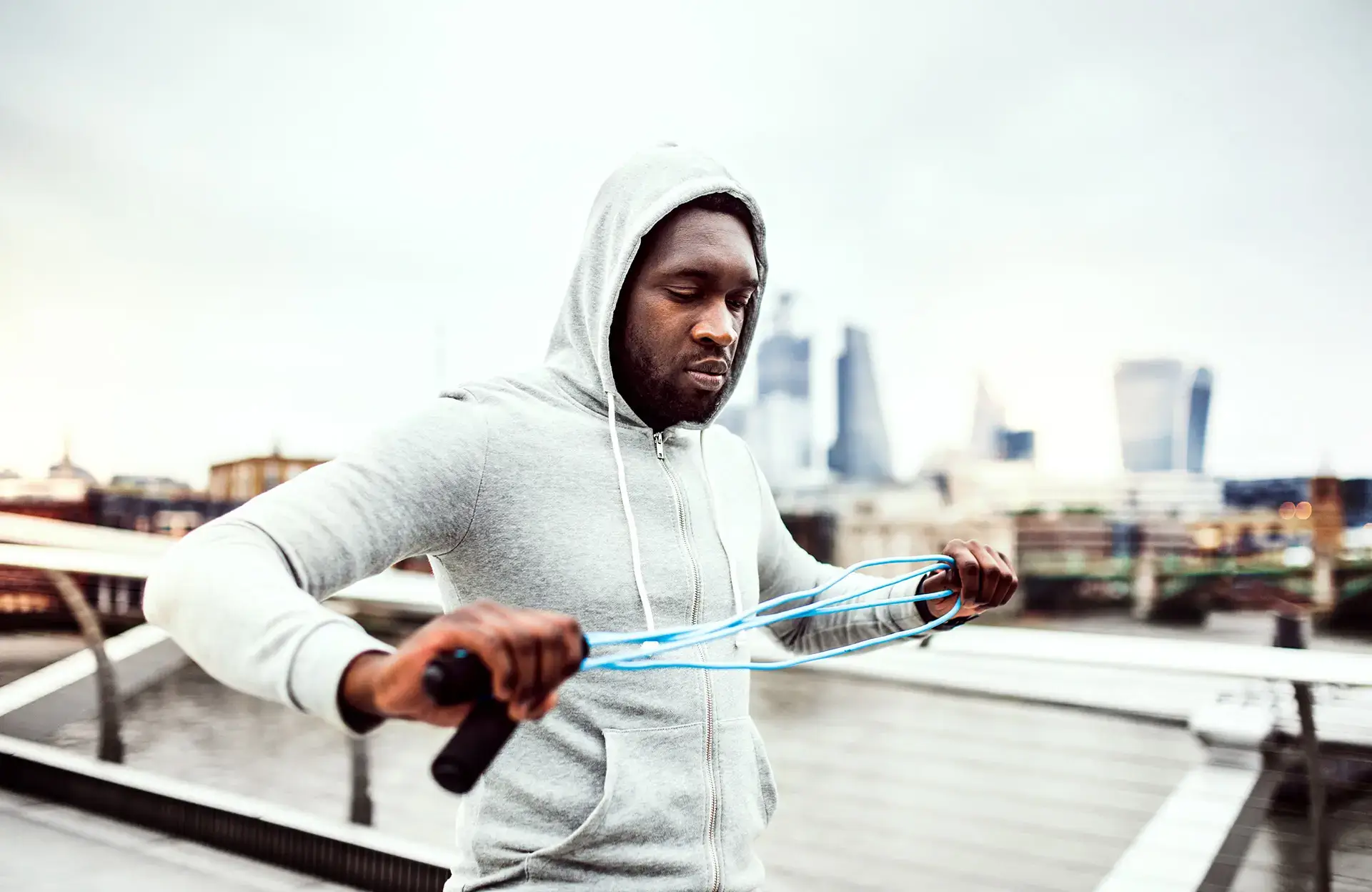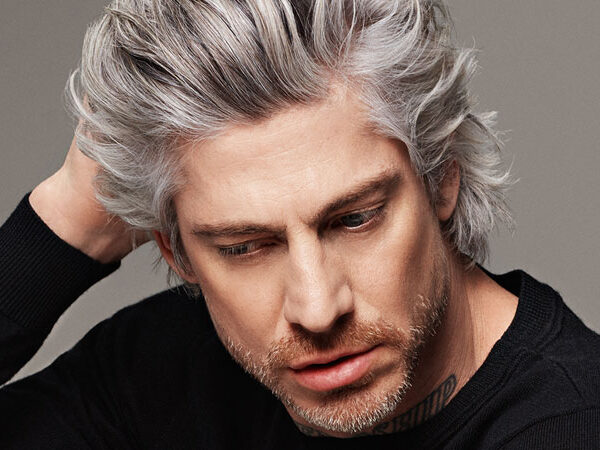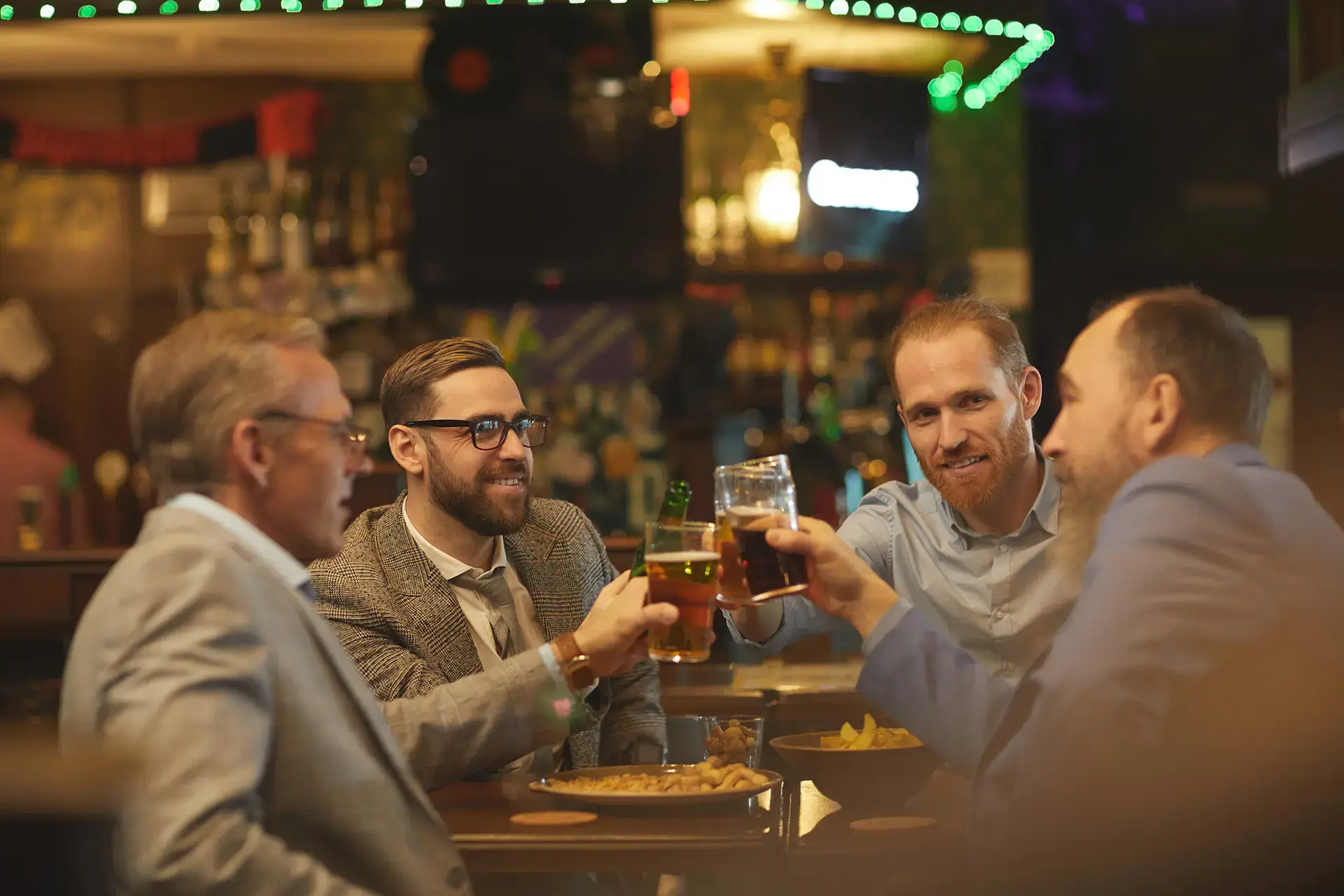What is TRT?
Testosterone Replacement Therapy in the UK: A Comprehensive Overview
Testosterone Replacement Therapy (TRT) is a rapidly growing field of medicine in the UK. It is a form of hormone replacement therapy for men with low testosterone levels. When administered by qualified doctors, TRT can significantly improve quality of life by reversing the symptoms of men suffering with hypogonadism.
There's a great deal of conflicting information about TRT, and the treatment has previously suffered from a degree of stigma and misunderstanding. Thankfully, the numerous benefits of this safe and effective therapy are now more widely understood. This guide is designed to cover everything you need to know about TRT, including the latest evidence and guidelines.
At Urban TRT, our goal is to change the lives of men for the better. Our experienced doctors offer advanced testosterone treatments, tailored to your particular needs.
If you would like to speak to one of our team, or have a specific question not covered below, click the links at the top of this article.
What is testosterone?
Testosterone is a vital hormone that plays a critical role in many aspects of male health. It is essential for the development of male reproductive organs, such as the testes and prostate, and drives the emergence of male characteristics, including increased bone density, muscle mass, and body hair growth.
Although present in both sexes, testosterone is found at much higher levels in men. It helps to regulate libido and supports sexual and reproductive health, fertility, cognitive function, mental well-being and overall energy levels.
Testosterone levels typically peak during adolescence and early adulthood, gradually declining after the age of 30. Insufficient testosterone production can result in a condition known as hypogonadism, which can lead to a range of physical and psychological issues, including frailty, depression, and erectile dysfunction.


What are the symptoms of low testosterone?
Some men are born with low testosterone. Others experience a faster decline due to genetics, stress, unhealthy habits, or aging. Whatever the cause or age at which you develop "low-T", it can have significant impacts on your physical, mental and emotional health. Some of the main symptoms include:
- Low energy levels
- Muscle loss
- Loss of libido
- Erectile dysfunction
- Depression and anxiety
- Loss of confidence and focus.
Find out more about the symptoms of low testosterone and take our symptom checking questionnaire, to see if TRT could help you feel better.
What causes low testosterone?
You may find your testosterone levels declining for a variety of reasons, at different stages of life. Some men are born with low testosterone levels (primary hypogonadism), or the decline in levels can be part of the natural aging process. There are a wide variety of other medical, lifestyle and environmental factors that can also impact on testosterone production. These are some of the most common:
- Injury or trauma to the testes
- Medications used to treat conditions including high blood pressure, asthma and depression
- Cancer treatments
- Medical conditions including hypothyroidism (underactive thyroid), hyperthyroidism (overactive thyroid), type 1 and 2 diabetes, kidney disease
- Eating disorders
- Chronic stress and depression
- Unhealthy lifestyles including smoking, alcohol abuse, poor diet, lack of sleep
- Steroid abuse
- Environmental factors, including chemical and micro-plastic exposure (this is not definitively proven, but is increasingly mentioned as a potential factor).
Each of these factors may not, on its own, cause low testosterone, but together they can build up and impact on your hormone levels.


Is it possible to increase testosterone levels naturally?
There are several natural ways you can try to increase and maintain healthy levels of testosterone in your body. These include regular exercise, lifting weights, eating a healthy balanced diet, minimising stress and getting good quality sleep. You should also limit alcohol and get sufficient Vitamin D.
Some herbal supplements also state that they can boost testosterone, including ginger, horny goat weed and shilajit, although there is limited medical evidence to support this.
While these habits are all beneficial for your health, there’s no evidence they significantly and permanently increase testosterone levels. The only way to confirm what your current testosterone levels are is with a blood test. Urban TRT offers a simple, finger prick test, that will give you the initial answers you need.
How we administer TRT
At Urban TRT, we restore testosterone levels using synthetic testosterone, ensuring they remain within a healthy, natural range. We offer TRT in three forms: gel, injection, or tablet.
Testosterone Gel:Apply to the arms, shoulders, or abdomen. The skin absorbs the gel over 2–5 hours. Avoid skin contact with others during this time to prevent transfer.
Testosterone Injections:This is the most popular method. Injections are typically needed twice weekly, in the muscle of the thigh, hip, buttock or abdomen.
Testosterone Pills:Oral testosterone therapy is now available on request. Speak to our doctors for more information about this option.
In the UK, most men receive testosterone through intramuscular injections because the NHS and many men’s clinics prescribe Testosterone Enanthate. This solution is more affordable but comes in a thicker, alcohol-heavy oil, requiring larger needles to prevent injection-site irritation.
At Urban TRT, we prioritise the highest standard of care. That’s why we also offer Testosterone Cypionate for injections. This form comes in a thinner oil, allowing for virtually painless subcutaneous injections (into belly fat) with a much smaller needle.
During your consultation, our doctors will discuss the merits of the different forms of TRT we offer, and help you decide on the best option for your particular circumstances.
Find out more about our treatment options for low testosterone.


Are there any side effects to TRT?
Most side effects of TRT can be managed by your Urban TRT doctor, who will monitor your treatment and adjust it as needed. The latest research has shown that previous concerns about the links between TRT and heart disease are unfounded. Similarly, any link between TRT and prostate cancer in healthy men with low testosterone has now been discounted in a 2023 study.
TRT can raise oestrogen levels, which may cause side effects if not managed correctly. Our doctors will monitor your oestrogen and prescribe medication to block excess production if needed. This keeps your hormone levels balanced and prevents issues like swelling, mood swings, or reduced libido.
When poorly managed, TRT side effects can include water retention, “man boobs,” anxiety, hair loss or low libido. At Urban TRT, our expert team ensures your treatment is safe and effective. We will carry out regular blood tests and consultations and adjust your treatment protocol as needed.
The latest research on TRT
Medical scientists regularly carry out studies to ensure the safety of TRT.
A landmark study in 2023 published in the New England Journal of Medicine showed that TRT does not increase the risk of cardiovascular disease versus a placebo. Other studies have suggested that, in fact, TRT can improve lifespan and overall health.
Meanwhile, a comprehensive study published in 2023 by JAMA Network open, and reported by Harvard Health Publishing, reported that TRT in men with low testosterone levels does not increase their risk of developing prostate cancer.
Unfortunately, there is still a great deal of misinformation about TRT, but it has been proven time and again to be a safe and effective treatment since its introduction in the 1950s. In it's essence, it is simply replacing a naturally occurring hormone which the body now missing.
Contact Urban TRT, and we’ll help you assess whether TRT is right for you. For more information, take a look at our article TRT - Separating Fact From Fiction.


Managing oestrogen levels on TRT
TRT can increase oestrogen levels if not properly managed because the body’s aromatase enzyme converts excess testosterone into oestrogen.
High oestrogen may lead to side effects such as gynaecomastia ("man boobs"), infertility, water retention, anxiety, low libido, and mood swings. To prevent this, we regularly carry out blood tests to ensure your oestrogen levels stay within a healthy range. If needed, our doctors will prescribe medication to block excess oestrogen production.
Most men on TRT do not develop high oestrogen levels, but this depends on individual biology. At Urban TRT, we tailor each TRT programme to your specific needs, with our doctors ready to adjust your treatment to ensure safe, effective results.
What are the typical testosterone levels in men?
Understanding the typical testosterone range for your age can be very useful. Identifying low testosterone early improves the likelihood of successful treatment. If left untreated, low testosterone symptoms can become a source of considerable frustration and unhappiness.
In healthy men aged 20 to 40, normal testosterone levels typically fall between 8 and 29 nmol/L. Men at the lower end of this spectrum may experience noticeable symptoms. Please note: nmol/l stands for nanomoles per litre.
Eligibility for TRT
Generally, TRT treatment is offered to individuals whose testosterone levels fall below 15 nmol/L as an indication for therapy, or 0.225nmol/L or lower free testosterone.
If you suspect you have low testosterone levels, we recommend taking our ADAM Questionnaire and booking a blood test.


Why choose Urban TRT for Testosterone Replacement Therapy in the UK?
Finding a doctor to prescribe TRT in the UK can be difficult, and the NHS may not always offer the support you need. To address this, we created Urban TRT. Founded on the principles of care, expertise, and excellence, Urban TRT is a doctor-led venture with a rich background in medical science and patient-centred care.
We aim to help men across the UK with low testosterone take control of their health. After completing your initial blood test at home, we assess your hormone levels and recommend the next steps. Your monthly cost includes all doctor consultations and follow-up support.
Our experienced team delivers safe, effective TRT for men with low testosterone. What sets us apart is our commitment to understanding and addressing each individual's unique hormonal needs. At Urban TRT, you are more than just a patient; you are a valued member of our family and your journey towards hormonal balance and vitality is our shared mission.
Below, you’ll find answers to some of the most frequently asked questions about TRT in the UK. Start your journey to better health today.
Testosterone Replacement Therapy : FAQs
What are the side effects of TRT?
«TRT can significantly improve quality of life for individuals with low testosterone, particularly in energy, mood, and bone health. However, it requires careful monitoring to identify and treat potential side effects.
Two common side effects include testicular atrophy (shrinking of the testicles) and reduced fertility. At Urban TRT, we address this risk by offering HCG (Human Chorionic Gonadotropin) and HMG (Human Menopausal Gonadotropin). These hormones help maintain both the size and function of the testicles during treatment.
Some men may also experience increased oestrogen levels as testosterone is naturally converted into oestrogen by aromatase.
Higher oestrogen levels can cause water retention, tiredness, belly fat, poor erections, low libido, moodiness, gynaecomastia, muscle loss, and depression. On the other hand, too little oestrogen can lead to low sex drive, belly fat, bone loss, and osteoporosis.
To maintain optimal hormone balance, we offer bespoke TRT plans with regular blood tests to monitor your progress. If necessary, our doctors can prescribe aromatase inhibitors to reduce oestrogen and keep hormone levels balanced.
Consulting a reputable healthcare provider is essential to maximise benefits and minimise risks from TRT. The doctors at Urban TRT are amongst the leading TRT practitioners in the UK, so you are in safe hands with us.
Can younger men have low testosterone?
«Yes. While testosterone levels naturally decline with age, low testosterone can affect men of all ages.
Factors such as stress, poor diet, lack of exercise and certain medical conditions can lead to low testosterone levels in younger men. TRT can help restore hormonal balance, improving quality of life, whatever your age.
Does TRT increase the risk of prostate cancer?
«Research does not support the claim that testosterone replacement therapy increases the risk of prostate cancer. In fact, studies suggest that men with normal testosterone levels have a lower risk of of aggressive prostate cancer than those with low levels.
Proper medical supervisions during TRT ensures safety and mitigates any concerns.
Does testosterone make you angry?
«Balanced testosterone levels typically improve mood, reduce irritability and enhance overall emotional wellbeing.
Aggression is a difficult concept to measure accurately as it's subjective and personal. That said, studies have shown that aggressive behaviour is more commonly linked to hormonal imbalances or misuse of testosterone, not properly managed TRT.
Can I get TRT on the NHS?
«Yes it is possible, under certain circumstances, to access TRT on the NHS. If you book an appointment to discuss possible low testosterone levels with your GP, they will first need to rule out any other causes for your symptoms. These can include stress, depression, poor diet, lack of exercise and more.
If it is concluded that you do indeed have low testosterone, you may be sent for further testing. The threshold for qualifying for a low testosterone diagnosis on the NHS is as low as 8.6 nmol/L for total testosterone. In our experience, men can experience symptoms starting from far higher levels than this. For example, loss of libido and low energy can be experienced from levels of 15 nmol/L.
If your GP decides to refer you for further testing by an endocrinologist, the average waiting time is reported to be around 18 weeks, but it can be far longer.
So, while you may be able to secure TRT on the NHS, the process is likely to be slow and challenging. By the time treatment begins, symptoms may have significantly affected your lifestyle.
With Urban TRT, your experience will be much faster and more personalised. Contact us today to book a convenient at-home blood test.
Our fully qualified TRT specialists will follow up with a tailored treatment plan for your needs.
Do I have to use injections for TRT?
«No, there are are topical options available if you prefer. Gels, such as Testogel, are a convenient way to administer testosterone, which is absorbed through the skin into the blood stream after being rubbed in. Your Urban TRT doctor will discuss your treatment preferences with you and the options available, and prescribe the most appropriate for your needs.
How long does it take for TRT to work?
«How quickly TRT works is different for each individual who is treated. Some people will notice a slight improvement after their first TRT treatment, whilst in others it can take weeks or even months for the full effects to be felt. But everyone who is treated does feel better eventually, so it's important to be patient.
Increased energy levels are often the first sign that the treatment is taking effect. This is frequently coupled with improved mood, heightened concentration levels plus an improvement in morning erections.
Your Urban TRT doctors will monitor your progress and it's important that you let them know how you are feeling. They will adjust your dose as needed to ensure you make a full recovery from the debilitating symptoms of low testosterone.
Why is a PSA test important before starting TRT?
«A prostate-specific antigen test (PSA) is always recommended before starting TRT, in order to provide a baseline level. As a precaution, your PSA should checked again 6 - 12 weeks after starting therapy. Please note, however, that research does not support the claim that TRT increases the risk of prostate cancer. In fact, clinical studies have suggested that men with normal testosterone levels have a lower risk of aggressive prostate cancer than those with low levels.
At Urban TRT your health and wellbeing is always our top concern. We provide proper medical supervision during your treatment to ensure your safety and mitigate any concerns you may have.
We offer PSA blood tests from our own partner laboratory, but blood tests from other regulated laboratories are accepted, provided they are recent and contain testosterone and PSA levels.
How long will I have to take TRT for?
«The benefits of TRT will stop once you stop taking the treatment. It will be your decision how long you want to continue taking TRT for and whether you want to stay on the treatment for life. Typically TRT is viewed as along-term commitment.
Although you may not want to rely on TRT indefinitely, it's important to understand that stopping treatment would mean a full return of your symptoms.
If you are considering discontinuing the treatment, we recommend a balanced TRT approach, combined with HCG. This is the safest way to preserve your natural testosterone production.
Adopting a healthier lifestyle can also support your testosterone production and enhance wellbeing. We recommend eating a nutritious diet, exercising regularly, getting quality sleep and losing any excess weight.
Before stopping TRT, consult your Urban TRT doctor for a safe, controlled reduction plan
Who shouldn't take TRT?
«Certain individuals should avoid testosterone replacement therapy (TRT) due to potential health risks.
TRT is not advised in individuals with the following conditions:
- Active prostate cancer
- Male breast cancer
- Elevated red blood cell levels (haematocrit >54%)
- Severe, chronic heart failure.
If you are planning to start a family, you should discuss this with your doctor, who will be able to prescribe medication to protect your fertility.
How low do my testosterone levels need to be for me to be eligible for TRT?
«Generally, TRT treatment is offered to individuals whose testosterone levels fall below 15 u/nmol as an indication for therapy.
Do you offer Nebido testosterone injections?
«Nebido is a type of TRT injection that releases testosterone into the body gradually over a period of time. These treatments are known as a depot injection and are offered by the NHS in the UK to men with qualifying levels of low testosterone.
We do not currently offer this particular treatment at Urban TRT as in our experience, it does not result in steady testosterone levels. Book a blood test to understand your own testosterone levels and discuss your TRT options with one of our doctors.
Can low testosterone cause erectile dysfunction?
«Low testosterone can have a big impact on a man’s body; lowering sexual desire and decreasing the chance of having spontaneous or sexual-related erections.
This is because testosterone can influence erections on two levels. In your central nervous system (CNS), testosterone can push your CNS to release neurotransmitters that help you achieve an erection.
Similarly, testosterone can also stimulate your spinal nerves which result in changes in your blood vessels, which can help you achieve and maintain an erection.
Although there are some links that would suggest low levels of testosterone can have an impact on your ability to achieve an erection, it’s not always the case. Some men are able to have normal erections, even if their testosterone levels fall well below the average.
People with low testosterone levels often experience other health conditions, such as heart disease and type 2 diabetes, which can all also play a role in erectile dysfunction.
Find out more about the causes of erectile dysfunction and premature ejaculation.
What is the optimum level of testosterone for men?
«Some people mistakenly think that it's always better for me to have higher testosterone levels. In fact, there is no ‘correct’ level of testosterone for a man because every patient is completely different and a range of factors determine what’s ‘normal’ for you. Appropriate levels of testosterone are shown as a range and they are also age dependent. So for example, University Hospitals Sussex NHS Foundation Trust states the following reference range for
males aged 18–49 years: 8.64–29.0 nmol/L.
It is a myth that higher testosterone levels are always better. Although high levels may be good for some people, for others they may cause a range of side effects – for example, back pain, acne, excessive body hair or headaches.
This is why it's vital to consult with a fully qualified doctor rather than simply buying testosterone online. At Urban TRT our medical team will devise a tailored testosterone replacement protocol, targeted to your own particular needs.
Is TRT only for men who struggle to get an erection?
«This isn’t true, TRT can be used to tackle a range of symptoms that come with testosterone deficiency including hair loss, insomnia and low energy levels.
Helping improve libido and reducing the impact of erectile dysfunction are an important benefit that comes with TRT, but they are not the only reason why men would choose to go on this type of hormone replacement treatment.

